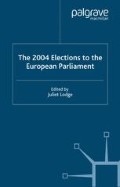As in most EU member states, it has become customary in Ireland to regard European Parliament elections as ‘second order’ elections in the sense that their function is widely perceived to be a test of the popularity of political parties and politicians between general elections. On those rare occasions when national and EP elections coincide, the EP election often provides a valuable indication of potential threats lying behind the general election vote insofar as voters are willing to ‘take a risk’ with their EP vote and hence produce a set of results that contrasts with the national electoral vote in ways that may be instructive. This is due to an instinctive tendency on the part of any electorate to exercise more caution in a general election than in an EP election, a tendency whose nuances are obviously all the greater in the specifi c PR(STV) method of voting used in Ireland (and Malta). In Ireland, EP elections are taken very seriously by the political parties because they are fought on domestic issues and the results are seen as a ‘snapshot’ of public opinion, but also because ‘new faces’ can be introduced to the electorate as EP candidates without it mattering very much if they actually get elected. Parties that do badly in EP elections can in any case draw comfort from academic research that shows that EP election results are a poor indicator of subsequent general election performance. Voters for their part have taken a fairly relaxed view of EP elections with turnout generally being lower than in general elections. In the 1992 general election, for example, there was a 68 per cent turnout but it was only 44 per cent in the 1994 EP elections. Such EP voting apathy may now be less of a problem as EP election turnout has recently started to rise again (notwithstanding the continuing decline elsewhere in the EU). The practice of holding another poll on the same day as an EP election has become more the rule than the exception in Ireland. For example, in 1979 and 2004, local government elections were held simultaneously with the EP election; as was a constitutional referendum in 1984 and 2004. It is diffi cult, of course, to ascertain what effect on turnout these concurrent polls exercise, but it is clear that Irish governments have become increasingly reluctant to allow an EP poll to go ahead without it being harnessed to at least one other test of public opinion. The traditional apathy evident at EP elections in Ireland can be attributed to the apparent ‘remoteness’ of the EU institutions, the sometimes arcane policy issues involved, and a feeling that the verdict of the voters will make little impact in a Parliament that is itself still searching for a definitive role in the EU policy-making process. Moreover, the three principal political parties not only support EU membership unequivocally, but differ very little on appropriate policies to pursue in the EU context. On issues of major national interest, there is a high degree of consensus: agriculture; regional policy; fi scal harmonisation; and institutional reform. In EP election campaigns, therefore, parties try with some difficulty to distinguish themselves from each other. As a 1994 newspaper headline put it: ‘Euro-candidates struggle to bury their similarities’. Against such a background of consensus, electoral excitement can be stirred up only by intra-party bickering, local issues, and local personalities. Both in 1999 and in 2004, independents who were successfully elected owed their success to idiosyncratic factors without displaying a great knowledge of, or even making references to, the European Union in their campaigning.
Access this chapter
Tax calculation will be finalised at checkout
Purchases are for personal use only
Preview
Unable to display preview. Download preview PDF.
Editor information
Editors and Affiliations
Copyright information
© 2005 Edward Moxon-Browne
About this chapter
Cite this chapter
Moxon-Browne, E. (2005). Ireland. In: Lodge, J. (eds) The 2004 Elections to the European Parliament. EU Election Studies. Palgrave Macmillan, London. https://doi.org/10.1057/9780230523821_17
Download citation
DOI: https://doi.org/10.1057/9780230523821_17
Publisher Name: Palgrave Macmillan, London
Print ISBN: 978-1-4039-3518-2
Online ISBN: 978-0-230-52382-1
eBook Packages: Palgrave Political & Intern. Studies CollectionPolitical Science and International Studies (R0)

